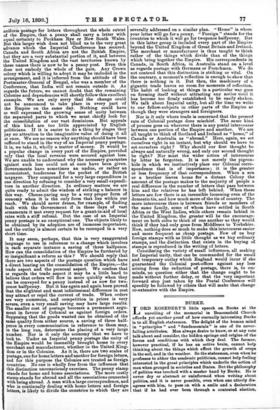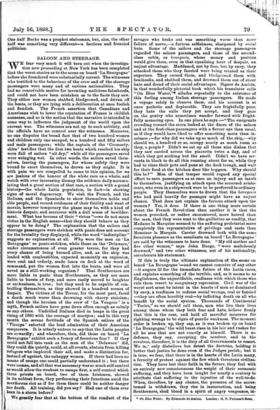BURKE.
TAORD ROSEBERY'S little speech on Burke at the unveiling of the memorial in Beaconsfield Church affords yet another proof of how eternally interesting Burke is to all English statesmen. The delight of the human mind in " principles " and " fundamentals" is one of its never- failing attributes. Men always desire to know, or at any rate talk about and consider, the hidden springs and origins of the forces and conditions with which they deal. The farmer, however practical, if he has an active brain, cannot help thinking about the things which affect the growth of crops in the soil, and in the weather. So the statesman, even when he professes to abhor the academic politician, cannot help feeling interested in the great principles which underlie the action of men when grouped in societies and States. But the philosophy of politics was touched with a master hand by Burke. He is never dry or abstract or uninformed when writing about politics, and it is never possible, even when one utterly dis- agrees with him, to pass on with a smile and a declaration that if he had ever been through a contested election,
or sat in the House of Commons, he would have thought and written very differently. He writes always as the man who has seen with his own eyes, and not as a mere paper philosopher. In the "Reflections on the French Revolu- tion " or the " Thoughts on the Present Discontents" there is never any suggestion of the pedant in his study, with folios around him instead of men, and paper and ink in lien of flesh and blood. No wonder, then, that Burke interests the politicians. He gives them the delight of first principles and of generalisations, and yet is always at close quarters with his subject. One says: " That is sound and right," or " That is wrong and mischievous," but never " This is absurd and utterly impossible in real politics."
But though Burke was both a political philosopher and a practical politician, or rather a man who lived with and worked among practical politicians, it would be most unwise to talk as if he was equally great in these two capacities. The exact opposite is the truth. He was a great and wise political philosopher, and a most unsuccessful and unwise politician.
Lord Rosebery, following many previous critics, speaks as if Burke's exclusion from the Cabinet was something strange and unjustifiable. It was the most natural and proper thing in the world. Burke's violence and imprudence, his frenzied partisanship, and his more than eighteenth-century love of a job quite unfitted him for the work of counsel and government.
It was not pride of birth that prevented the great Whig leaders from making him a Cabinet Minister, but rather their instinct for government. The age was doubtless an aristocratic one, but men little better born than Burke had held high office. His want of family did not hinder him half so much as his incapacity for the govern- ing of men. In excuse for the men who did not offer him Cabinet rank we may say what Lord Melbourne said of Brougham,—" How many and how great must have been the reasons which prevented any Government availing themselves of such talents." The sneer that the Venetian Oligarchy could not get over Burke's want of birth is in truth not well founded. " The ruling caste " were quite willing to make him a Peer. But in those days want of birth was probably a greater obstacle to a peerage than to high office. Unquestionably Burke the political philosopher and Burke the politician had little in common. The one uttered great truths, the other played a part which, if not exactly ignoble, was so perturbed and undignified as to profoundly shock and disgust those who saw it at first hand, or who now study it with any minuteness. In principle, in mental standpoint, in fact in the study, Burke was a typical Englishman. It would be impossible to imagine anything more English than Burke's dislike of abstract formulae, his love of compromise, his hatred of phrases, his distrust of clap-trap. He deified the Left Centre and made the via media the path of salvation, as have all true English- men, each in his mental degree, both before and since his time. His defence of party, his denunciation of the French for their breach with the past, his support of the Ameri- cans in practice and his desire to maintain at the same time the theoretical supremacy of Parliament, were all intensely English and Left Centre in feeling. "Nothing absolute," said Burke, " can be affirmed on any moral or political question." There is the very essence of the English- man's creed,—' Don't let's commit ourselves too strictly to things that no one on earth can feel quite sure about.' Take, again, his enthusiastic approval of Bolingbroke's declaration that he would rather have a Monarchy than a Republic, " because it was easier to engraft upon a Monarchy the advantages of a Republic than upon a Republic the advan- tages of a Monarchy." That is the kind of thing that makes every Englishman feel delighted. It hits him, as it hit Burke, exactly between wind and water. Lastly, how very English, if also very true, was Burke's criticism of the Jacobins : " They would rather domineer in a parish of atheists than rule the whole Christian world;" or: "Their errors were fundamental, their improvements superficial." That is the kind of attitude which all Englishmen are inclined to take up towards that furious new creation, instead of reformatory patching, which delights the French innovator. Often, indeed, Burke's later and anti-Jacobin writings read like an inspired version of Noodle's oration,—that marvellous piece of comedy in which Sydney Smith has grouped all the possible general objections to any proposed change in the Constitution. But turn from
Burke the thoughtful, high-minded, Left Centre political philosopher who loved orderly reformation but hated violent changes, and was always asking for compromise and modera- tion, to Burke the politician, to Burke intriguing with Fox and North for place and office, concocting with Francis and his gang highly coloured and sensational pleas to ruin Impey and Hastings, or raging with undignified heat and frenzy against his old associates because they would not denounce the French Republic or dared to propose a peace with regicides. Look at him raging like a very Jacobin in Westminster Hall in order to secure the destruction of Hastings on charges vamped up exactly as accusations were vamped up in the Convention. " Sir Walter Raleigh was called a spider of hell. This was foolish and indecent in Lord Coke. Had he been a manager on this trial he would have been guilty of a neglect of duty had he not called the prisoner a spider of hell." Take, again, the infamous phrases in which he described Warren Hastings a prisoner on his trial, remember—as "a captain-general of iniquity, thief, tyrant, robber, cheat, sharper, swindler."
This savage and ape-like fury is worthy of the Committee of Public Safety. It is the authentic voice of Barrere, of the true Jacobin who, careless of truth or decency, is only anxious to strangle his opponent with a rope woven of invective, false suggestions, and sensational phrases.
Nothing, in fact, could possibly have been more un-English than Bnrke's conduct of the Warren Hastings impeach- ment. He believed, or at any rate adopted, the cock-and-bull stories of oppression brought him by Francis, and then clothed them with all the matchless rhetorical artifices at his command. We laugh, or rather are sickened, by Barrere's fustian about the Vengeue and the other legends with which he adorned his speeches in the Tribune; but if the truth must be told, Burke was just as shameless or as ridiculous when he thundered about the Rohillas and the nation eminent in arms and arts who had been exterminated by the cruel oppressor of Asia. There was no Rohilla nation and they were never exterminated, and on the whole there was far more basis for the ‘Vengeur ' legend of Barere than for Burke's vitriolic bombast. Yet we loathe the wretched Conventionnaire as the prince of shoddy and unveracions rhetoricians, and wor- ship Burke, forgetting that his career was sustained with equal excesses against the spirit of justice and of political decency.
How un-English, too, was Burke's quarrel with Fox. One of the best and most wholesome traditions of our public life has been that in the House of Commons men may differ to any ex- tent and yet retain personal relations. Burke could not endure this wholesome tolerance when once his passions were aroused. A man might have been excused for not following, or indeed for cutting himself off from all connection with, Fox, when he formed the coalition with North, for here a matter of con• duct was involved. To forgive Fox's career of faction, or rather to share it, and then to quarrel on a matter of opinion, was detestably nn-English.
But though we cannot deal with Burke without pointing out the bad as well as the good side of the man, we have the satisfaction of knowing that it is the good which survives in the popular mind, and not the bad. The violence and the injustice of Burke's actions as a practical politician are rapidly becoming forgotten, while the wisdom to be found in his writings is more and more influencing men's minds.
When he approaches an abstract proposition in politics, or rather a proposition cleared of party and personal feeling, we must all acknowledge that his mental attitude is almost perfect. He is fair, he is far-seeing, he is moderate, and yet he has the power of going down to the roots of things. He never states his political propositions too absolutely, and yet he avoids the mistake of making politics appear purely oppor- tunist. If one could forget Burke's practical political life and the monstrous injustice he did to Hastings, one might say almost without exaggeration that his political writings have the inspiration of the Hebrew prophets, and deserve the panegyric which Milton bestowed on those who were the first and greatest of political teachers :-
"—Men divinely taught and better teaching The solid rules of civil government, In their majestic, unaffected style, Than all the oratory of Greece or Rome. In them is plainest taught and easiest learnt What makes a nation happy, keeps it so, What ruins kingdoms and lays cities flat."
One half Burke was a prophet statesman, but, alas, the other half was something very different—a factions and frenzied politician.




































 Previous page
Previous page